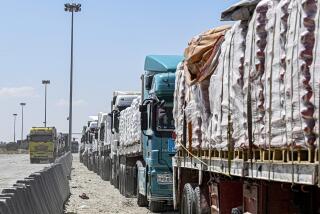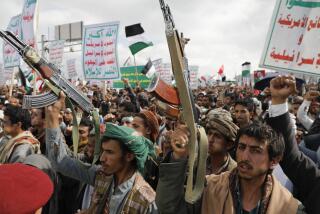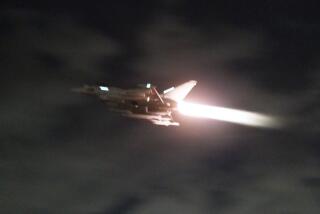Secret Plan Told : Egypt Weighs Military Aid to Gulf States
- Share via
CAIRO — The ink had barely dried on last month’s Arab League decision to allow member states to resume diplomatic ties with Egypt when, with great public fanfare, a high-ranking Egyptian military delegation flew to Kuwait to make a point that it was hoped would not be lost on Iran.
Egypt, the unwritten message said, was back in the Arab fold and ready to commit its substantial military resources to the defense of its smaller Persian Gulf allies, should the need arise.
In the ensuing weeks, there have been discussions, in Cairo and Kuwait, about a three-phase Egyptian contingency plan for military intervention in the Persian Gulf.
The plan itself is still secret, but informed military and civilian sources said the first phase involves a proposal to station Egyptian air defense personnel in Kuwait, which is seeking to improve its air defenses in the wake of several attacks by Iranian Silkworm missiles.
Plan Includes Combat Pilots
Stages 2 and 3 of the plan call for sending combat pilots and, as a last resort, ground troops to the gulf, the sources said.
The Egyptians have had contingency plans for the gulf on the shelf for some time, but recent events in the Iran-Iraq War, combined with growing concern over the poor performance of the Iraqi armed forces, have caused them “to dust off the planning and take a much closer look at the options,” a senior military source said.
One such option, it is rumored, might be the creation of an Arab gulf force to which Egypt would contribute the largest number of troops. According to diplomatic sources, this would be a sort of pan-Arab rapid deployment force, to be sent to the gulf if it became necessary to defend Kuwait against an Iranian attack--or to save Iraq from defeat in the event of an Iranian breakthrough, which would most likely come on the southern front near the beleaguered Iraqi port city of Basra.
Sent Troops to Kuwait
This idea is not without precedent. In 1961, Egypt--along with Jordan, Saudi Arabia and Sudan--sent troops to Kuwait to thwart an earlier territorial claim by Iraq.
However, while such options exist on paper, Egypt is extremely reluctant to consider moving beyond the first stage of its contingency planning, which would increase the assistance that Egypt already provides to Kuwait’s air defense system, several informed sources said.
One reason for this reluctance is the existence of another, more disastrous precedent--Egypt’s military misadventure in Yemen in the 1960s. The late President Gamal Abdel Nasser’s intervention in the Yemeni civil war cost thousands of lives and is recalled in painful terms here, much the way the Vietnam War haunts the American conscience.
“The Yemen disaster is very deep-seated in the Egyptian mind,” said a Western defense analyst who has held extensive discussions on the gulf war with Egyptian officials. “You don’t have to remind them of it. They remind you. It’s one of the first things they mention when the topic turns to military intervention in the gulf.”
Another reason for Egypt’s caution is the realization that the Iran-Iraq War, now in its eighth year, is a much larger and, in human and material terms, far costlier conflict than any in which Egypt has fought, including its four wars with Israel. Sending troops to fight on foreign soil would not sit well at home, especially in view of the fact that the gulf states themselves seem reluctant to commit their own--and, in Saudi Arabia’s case, substantial--military resources to the conflict.
“You hear that a lot when talking to Egyptian officials,” a senior Western diplomat said. “They say, ‘Why should we get involved when these countries have all these planes and weapons and are afraid to use them?’ They suspect it’s another case of ‘We will fight to the last Egyptian,’ and they are not about to accept that again.”
Tugging against these restraints is a growing concern that Iraq’s handling of the war has been so inept that, without more help, it could start to lose it.
When the war began, Iraqi troops plunged into Iranian territory with a cocky self-assurance that their 5-to-1 superiority in armor and air power would overwhelm Iran and more than compensate for the latter’s much greater manpower. This confidence evaporated when the Iranians drove the Iraqis back across the border and then began to nibble away at Iraqi territory, most notably on the southern front, where they have pushed to within a few miles of Basra, Iraq’s second-largest city.
Most analysts attribute this reversal more to Iraq’s failure to use its armor and air power effectively than to Iran’s willingness to trade large losses for small territorial gains.
Even now, amid signs that the Iranians are preparing another major ground offensive, the Iraqis are not doing “what they should be doing, which is bombing Iranian supply lines and troop concentrations,” a Western military source said. “They are still flying high and dropping their bombs in the desert.”
The Iraqi air force has been very effective--against easy-to-target and defenseless civilian shipping bound for Iran. But Iraqi pilots, flying with strict orders not to put their expensive planes at risk, seem reluctant to shoot at anything that might shoot back at them.
Private Criticism
In private, Egyptian military officials have frequently criticized Iraq for this, but lately their comments have assumed “a tone of concern I haven’t heard before,” the Western military source said. He said that dismay over Iraq’s poor battlefield performance has given way to disgust.
Another concern emerging here is what some analysts already see as the failure of the U.S. military commitment in the gulf.
The United States has about 40 ships and nearly 20,000 men in or near the Persian Gulf, ostensibly to safeguard freedom of navigation. But, although the Navy has been able to protect the 11 Kuwaiti tankers it escorts through the gulf, Iraqi and Iranian attacks on other ships have doubled in the last few months. Also, the attacks have become deadlier, with the Iranians upgrading the firepower of their speedboat fleet to include recoilless rifles and incendiary projectiles that exact a higher toll in both lives and tonnage.
Clearly, navigation has become a lot less safe since the U.S. buildup began, even as the security of Kuwait and other small countries that support the United States is being increasingly threatened by Iran.
This leaves many analysts wondering how long the United States will be willing to commit such a large part of its naval forces to the protection of just 11 merchant ships in a war whose end is nowhere in sight. U.S. officials wonder about this, too, and are encouraging Egypt, as one diplomat said, to assume a greater role in defending the security of the gulf.
Encouragement, if not outright pressure, is also being applied by the gulf states, whose decision to renew diplomatic ties with Cairo was motivated largely by the desire to find an Arab counterweight to Iran.
Publicly, Egyptian officials deny that they are susceptible to such pressure. Privately, they concede that deteriorating circumstances in the gulf war could oblige Egypt to do more.
‘Field Study’ Made
Abdel-Halim abu Ghazala, the Egyptian defense minister, paid a high-profile visit to Kuwait earlier this month for what he called a “field study” of its security requirements. He reiterated Egypt’s commitment to Kuwait’s defense but said that any decision to send combat troops would require “endorsement by the (Egyptian) public.” However, he said, this need not apply to the dispatch of more “instructors and advisers.”
Egypt already has large numbers of advisers and so-called volunteers on private military contract to Kuwait and Iraq. But they are all in noncombat positions. Rumors that Egypt has sent combat pilots to Kuwait have been denied by Egyptian officials, and senior diplomatic sources say they have been assured by the Egyptians that the rumors are untrue.
However, the significance of the discussions with the Kuwaitis is that they involve proposals to send air defense personnel that, in the event of an Iranian air strike, could be caught up in combat.
The discussions have also dealt with Kuwait’s need to upgrade its air defenses, with the Kuwaitis seeking Egyptian advice on the possible purchase of an Italian-Swiss system known as Skyguard. This system, which employs short-range, radar-guided missiles, anti-aircraft guns and a computer to direct them both, is one that the Egyptians would have no problem manning. Egypt has 18 Skyguard batteries in its own air defense network.
Although the planning exists on paper for this and higher levels of involvement, there appears to be no clear agreement yet on matching each likely scenario to the appropriate level of response. But a number of military analysts think Egypt would at least have to commit air power to the gulf if Kuwait should become seriously threatened or if the Iranians capture Basra and try to move deeper into Iraqi territory.
In the meantime, the back-and-forth visits by military delegations are likely to continue in the hope that they will be a deterrent in themselves--by making Iran think twice before doing anything that might draw Egypt, the largest country in the Arab world, into the war against it.
More to Read
Sign up for Essential California
The most important California stories and recommendations in your inbox every morning.
You may occasionally receive promotional content from the Los Angeles Times.










